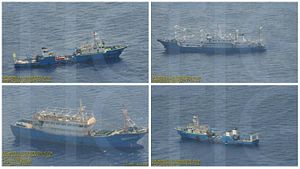As world leaders met for the G20 in Hangzhou, China, the Philippine government announced that it had sighted new Chinese vessels in the vicinity of Scarborough Shoal that included Chinese Coast Guard cutters and barges that might be precursors to reclamation and airfield construction like China has done at other shoals and reefs in the Spratly Islands. Philippine President Rodrigo Duterte called the reports from his military “unsettling” and his government is demanding explanation from the Chinese embassy.
But a Chinese Ministry of Foreign Affairs spokeswoman said that “China has…not taken new actions” and that “some people are hyping the situation by spreading that kind of information.” Subsequent evidence appears to back up her claim. As photographs of the purported barges and construction vessels have been released, they do not appear to justify concerns about imminent Chinese construction at the shoal, but do indicate China remains prepared to deny Filipino fishermen access to the shoal’s rich fishery, in violation of July’s Hague ruling under the U.N. Law of the Sea.
Admiral Richardson, the United States Chief of Naval Operations, revealed that Chinese reclamation at Scarborough Shoal appeared imminent this past March. Less than 200 nautical miles from Manila, military facilities like those China has built in the Spratlys, with airfields, hardened hangers, radars, and possible missile emplacements, would be a substantial threat to the Philippines and a major regional provocation. Since those March revelations, President Obama has reportedly warned President Xi personally on multiple occasions not to pursue similar construction at the shoal, and there may have been substantial behind-the-scenes efforts on the part of the U.S. to deter Chinese activity there.
Reclamation would not only be a rebuff of U.S. efforts, but the news also interrupted the G20 conference China was hosting, at which China was clear it did not want South China Sea issues brought up. News that China may have moved preliminary reclamation equipment to Scarborough Shoal was therefore a surprise to analysts who believed that if China did intend to reclaim the shoal, it would not do anything until after the conference in Hangzhou.
However, the photographs the Philippines used to make its assessment do not show barges or dredging equipment. Many of the photos, published over the weekend by the Philippine Secretary of Agriculture on Facebook and later released by the Department of National Defense, do show the “blue-coloured” vessels described by the Philippine Secretary of Defense, but they are not barges. Still other ships were described as having suspected “cable-laying” equipment that is more likely trawl-net reels or other longline fishing equipment. Absent additional evidence, this apparent exaggeration of Chinese activities by the Philippines, combined with Philippine President Duterte’s recent insult of President Obama, may make it harder for the U.S. to continue to credibly deter Chinese activity at the shoal.
Further, this apparent exaggeration distracts from focusing on the possible involvement of China’s Maritime Militias at Scarborough Shoal. All of those distinctive blue-hulled vessels, while not dredges or barges, are types of fishing vessels known to be operated by China’s fisherman militias who are used to assert Chinese claims, and harass foreign fishermen and government vessels, As quasi-civilian operatives, the militia’s activity has a degree of deniability that the Chinese Coast Guard and Navy would not have, and complicate the response and rules of engagement for foreign navies and law enforcement.
According to Andrew Erickson and Conor Kennedy of the U.S. Naval War College, the municipal “Maritime Militias” are made up of private fishermen and companies who receive additional salaries, benefits, and fuel subsidies. With training and support from the Chinese Navy, they also perform missions to support “maritime rights protection” at the behest of local Chinese military authorities, law enforcement, and fisheries agencies that include “regular declarations of sovereignty, conducting reconnaissance and patrols, cooperating with maritime law enforcement, participating in marine rescue, and supporting combat operations. They also repel foreign fishing vessels, safeguard islands and reefs, and provide disaster relief for civilians living there.” Not merely arrayed against foreign fishermen, these irregular maritime forces are also believed to be responsible for the extraordinary harassment of the U.S. Navy surveillance vessel USNS Impeccable in 2009.
In July, a Hague arbitration court convened to consider complaints by the Philippines against Chinese incursions, claims, and activity in the South China Sea. It ruled that the Scarborough Shoal lay within the Philippines’ Exclusive Economic Zone and that both China and the Philippines possessed “traditional fishing rights” at the Shoal. It may not be possible to positively identify the vessels sighted near Scarborough Shoal as part of the Maritime Militias from the known imagery, but the strong likelihood of Militia presence in concert with the Chinese Coast Guard vessels at the shoal shows that China continues to deny other countries access in accordance with the Hague ruling.
After rejecting the court’s decision, China has continued to keep Philippine fishermen out of the area and in August, the Philippine government even advised fishermen to avoid the shoal lest they continue to be subjected to harassment from Chinese Coast Guard and militia. As Bonnie Glaser of the Center for Strategic and International Studies recently told Reuters about new research on the role of China’s Coast Guard in South China Sea clashes, “We’re seeing bullying, harassment and ramming of vessels from countries whose coast guard and fishing vessels are much smaller, often to assert sovereignty throughout the South China Sea.” Consistent with this, China’s Coast Guard was seen blocking the Philippine Coast Guard from Scarborough Shoal as recently as August. So while there are no signs that China is preparing to reclaim Scarborough Shoal (for now), it does not diminish China’s defiance of the binding arbitration and unwillingness to allow access to Filipino fishermen yet, either.

































